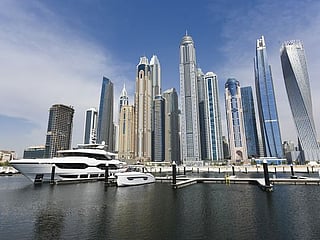GCC appetite for Shariah-compliant investments stay intact
Net inflows into some large Islamic funds in Middle East countries have remained positive

Also In This Package
Dubai: While most markets reeled in the pandemic chaos, investor appetite for Shariah-compliant investments held up in the GCC, rating agency Moody’s revealed, aiding growth of Islamic asset managers in the region.
Net inflows into some large Islamic funds in the GCC countries have remained positive despite weaker markets and lower oil prices, in contrast to the net outflows experience by many western peers, Moody’s noted.
This follows a few weeks after the rating agency flagged how asset managers in the Gulf region faced earnings pressure this year from COVID-related economic contraction and geopolitical uncertainties, warning then how their profitability will face moderate to high pressure over the next 12-18 months.
GCC economies under pressure
From parliamentary gridlock in Kuwait to paralyzed debt talks in Lebanon, investors in the Middle East have been facing a raft of risks, compounded by the biggest risk of them all being that current crude prices can’t balance the budgets of most of the region’s energy exporters.
Experts have often viewed Islamic investing as an evolving means to not being merely seen as a religiously guided investment but also as an ethical form of investing that promotes real economic activities that are socially desirable.
(Islamic asset management refers to overseeing Shariah-compliant investments, be it equities, Sukuk (Islamic bonds) and other securities, with the net effect of this investment approach generating competitive investment returns and encouraging ethical business practices.)
Finding shelter in Islamic investments
So, when conventional or orthodox investment avenues worldwide took a beating when markets were in free-fall mode during the peak of the COVID-19 crisis, investors in the Gulf region sought options beyond bonds or other safe-haven assets to invest in the region, and Islamic securities was one of them.
Similar to socially responsible investing, Shariah-compliant investing mandates social values and good governance by filtering out businesses that engage in activities, which among others, are deemed ‘unethical’ or ‘immoral’, according to Islamic principles.
“Islamic fund managers in the GCC region benefit from bespoke mandates with a range of affluent clients, including high net worth individuals, family offices, sovereign wealth funds and other government institutions,” said Vanessa Robert, a vice-president and senior credit officer at Moody’s. “These investors generally have high risk tolerance and long investment horizons.”
Shariah-compliant assets play big role
Shariah-compliant assets represent a big portion of total banking assets of the GCC, as per the Global Islamic Finance Markets Report. While in the Middle East and North African region, Islamic banking assets represent 14 per cent of total banking assets, in the GCC this market share is over 25 per cent.
Globally, Islamic finance assets are seen growing at an annual growth rate of 5.5 per cent to hit $3.4 trillion during the next five years. Moody’s flagged that growth in Islamic assets under management would slow to 2 per cent this year and 4 per cent next year.
S&P Ratings echo rebound hopes
Earlier this week, S&P Global Ratings opined how it saw the $2.5 trillion global Islamic finance industry on course to return to slow growth in 2021 after recovering from COVID-imposed lockdowns and subsequent recessions in core Islamic finance countries.
S&P Global Ratings expects the Islamic finance industry to show low-to-mid-single-digit growth in 2020-21 after 11.4 per cent in 2019 following strong Sukuk market performance,
S&P Global Ratings project volume of issuance to reach $100 billion in 2020 versus $162 billion in 2019 - when Turkey, returning GCC issuers, Malaysia and Indonesia supported the market. The Sukuk market was poised for good performance in 2020 but the pandemic and lower oil prices changed the outlook.
Saudi Arabia solidifies lead
Moody’s said investor appetite of Islamic investments is rising rapidly in Saudi Arabia, reflecting growing demand for Shariah-compliant products among both corporate and retail investors. Malaysia and Saudi Arabia are the largest Islamic financial service in the world, accounting for almost two-thirds of Islamic assets under management between them.
Saudi Arabia will continue a shift to more Shariah-compliant finance over the next 12-18 months as corporates and households increasingly use Islamic products, even as low oil prices and the coronavirus crisis cause economic challenges, Moody’s added.
Islamic financing in Saudi Arabia will reach around 80 per cent of system-wide loans within this period, from 78 per cent in 2019 and 70 per cent in 2013. This will bolster its position as the world’s largest Islamic finance market. It had total Islamic finance assets of $339 billion as of March 2020, leaving Malaysia a distant second with $145 billion.
Spurred issuances of Sukuk
A comprehensive set of Islamic finance regulations have spurred Saudi banks to issue Sukuk, Islamic products are now listed on the main market, and an Islamic mortgage refinancing business has been established, said Ashraf Madani, vice-president and senior analyst at Moody’s.
The industry will further benefit from increased government Sukuk issuance, potentially rising foreign investment supported by more lenient entry rules and deepening capital markets, the rating agency estimates.
A wave of mergers and acquisitions in Saudi Arabia and across the wider Gulf region is also accelerating Islamic finance reach. In Malaysia, innovative Shariah-compliant product offerings are driving growth in Islamic assets management. These include Simpanan Shariah, a Shariah-compliant employee provident fund.
Sign up for the Daily Briefing
Get the latest news and updates straight to your inbox








